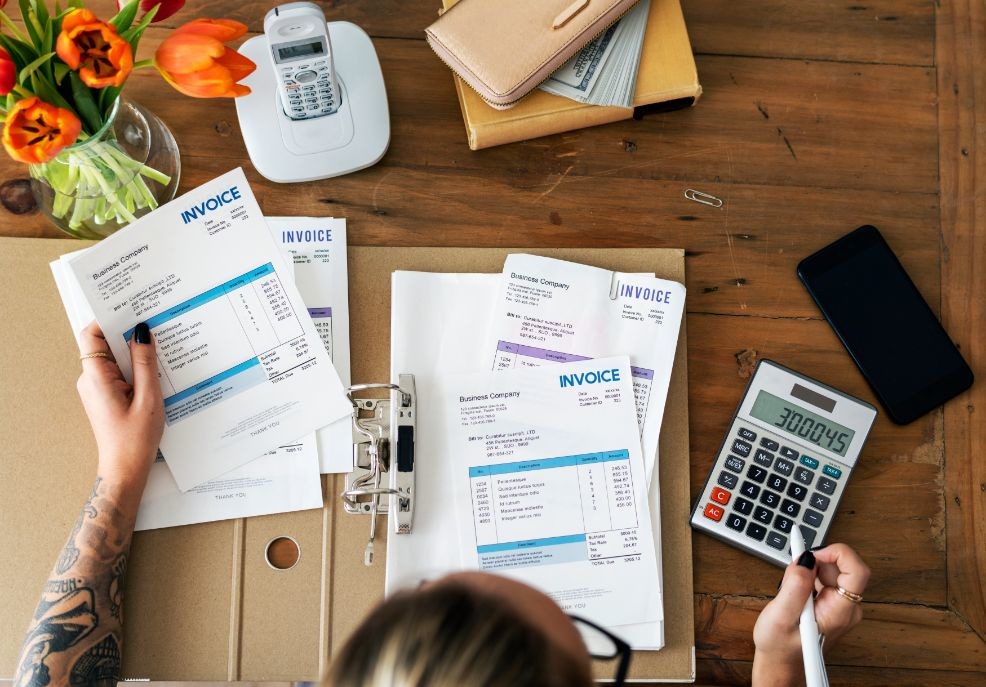Whether we like it or not, taxes are a part of daily life. For hundreds of years, key aspects of our society have been funded by them, including our healthcare system, defense services, and social services.
Levied by the UK Government, taxes are designed to raise revenue and are paid either directly through systems like Pay as You Earn (PAYE), or indirectly as part of a transaction such as paying VAT on a purchase.
Often, understanding taxes can be tricky so to make your life easier, tax experts at income-tax.co.uk have researched and compiled a list of the 10 most searched for questions about tax in the UK. In this article, we will answer each one to help you get a better understanding of your biggest tax-related queries.
Top 10 most Googled tax questions

So, which questions do you want answered the most?
How much tax will I pay?
Although not specifically outlined in the question, we’re assuming this question is about Income Tax as it is a frequently queried aspect of taxes.
How much Income Tax you will pay depends on two main aspects:
- The amount of income you receive that is above the Personal Allowance threshold
- The amount of income that falls within the specified tax bands
The current Personal Allowance is £12,570, so if you earn less than this amount annually, you will not pay Income Tax on it.
Otherwise, the Income Tax bands are as follows:
| Band | Taxable income | Tax rate |
| Personal Allowance | Up to £12,570 | 0% |
| Basic Rate | £12,571 to £50,270 | 20% |
| Higher Rate | £50,271 to £150,000 | 40% |
| Additional Rate | over £150,000 | 45% |
For example, if your annual salary is £30,000, the first £12,570 is not taxable but you will be taxed at a rate of 20% on the remaining amount. This means you will pay £3,486 of Income Tax over the year.
Income Tax is automatically deducted from your pay if you are employed through the Pay As You Earn (PAYE) system. If you are self-employed or have earnings outside of your salary, you will need to complete your Self Assessment online and declare how much tax you owe to HM Revenue and Customs (HMRC).
How much is my Car Tax?

Car tax is paid on vehicles when they are first registered which covers them for 12 months. After that, you are required to tax them every 6 or 12 months at a different tax rate.
When a vehicle is first registered, the rate of tax you will pay depends on the vehicle’s CO2 emissions. The following table outlines the tax for vehicles registered on or after 1 April 2017:
| CO2 emissions | Diesel cars (TC49) that meet the RDE2 standard and petrol cars (TC48) | All other diesel cars (TC49) | Alternative fuel cars (TC59) |
| 0g/km | £0 | £0 | £0 |
| 1 to 50g/km | £10 | £25 | £0 |
| 51 to 75g/km | £25 | £120 | £15 |
| 76 to 90g/km | £120 | £150 | £110 |
| 91 to 100g/km | £150 | £170 | £140 |
| 101 to 110g/km | £170 | £190 | £160 |
| 111 to 130g/km | £190 | £230 | £180 |
| 131 to 150g/km | £230 | £585 | £220 |
| 151 to 170g/km | £585 | £945 | £575 |
| 171 to 190g/km | £945 | £1,420 | £935 |
| 191 to 225g/km | £1,420 | £2,015 | £1,410 |
| 226 to 255g/km | £2,015 | £2,365 | £2,005 |
| Over 255g/km | £2,365 | £2,365 | £2,355 |
After 12 months, the rate of Car Tax you will pay depends on the type of fuel your car runs on, and whether you choose to pay every 12 month or 6 months. The Car Tax rates are as follows:
| Fuel type | Single 12 month payment | Single 12 month payment by Direct Debit | Total of 12 monthly payments by Direct Debit | Single 6 month payment | Single 6 month payment by Direct Debit |
| Petrol or diesel | £165 | £165 | £173.25 | £90.75 | £86.63 |
| Electric | £0 | N/A | N/A | £0 | N/A |
| Alternative | £155 | £155 | £162.75 |
What Council Tax band am I?
Council Tax is worked out based on the value of your property at a specific point in time. The Council Tax bands are worked out in England, Scotland and Wales as follows:
- England – Properties are put into Council Tax bands (A-H) dependent on the price they sold for in April 1991
- Scotland – Properties are put into Council Tax bands (A-H) dependent on the price they sold for in April 1991. The bands however, are different from the ones in England
- Wales – Properties are put into Council Tax bands (A-I) dependent on their market value on 1 April 2003
If you are unsure which Council Tax band you are in, you can check using the Government’s Council Tax Band checker on their website.
How much can you earn before paying tax?

As previously mentioned, in the UK you are entitled to a tax-free Personal Allowance of £12,570 each year. You will pay tax on any earnings over that threshold, excluding:
- Interest earned on savings
- The first £1,000 you earn as a self-employed individual (known as your ‘trading allowance’)
- The first £1,000 of income from renting a property, provided you are not using the Rent a Room Scheme
You will, however, not be entitled to Personal Allowance if your annual income exceeds £125,140.
What is Corporation Tax?
Corporation Tax is a tax paid in the UK by businesses. It is calculated based on a business’s annual profits.
Businesses subjected to Corporation Tax include:
- Limited companies
- Foreign companies with UK offices or branches
- Clubs, co-operatives, and any other unincorporated associations — e.g. sports clubs or community groups
The current rate for Corporation Tax is 19% of the profits. This is set to rise to 25% for the Financial Year starting 1 April 2023. Additionally, a small profits rate will be introduced so that companies with profits less than £50,000 will continue to pay Corporation Tax at a rate of 19%.
List of tax codes and what they mean
Tax codes are used by HMRC, and your employer if you have one, to identify how much tax-free income you are entitled to annually.
Your tax code is composed of several numbers and a letter. The numbers identify the amount of tax-free income you get, and the letter refers to your personal situation and the effect it has on your Personal Allowance.
For example, the most common tax code is 1257L, meaning you only have one job or pension. The ‘L’ means you are entitled to the standard tax-free Personal Allowance and the numbers refer to the amount which is £12,570.
How much is Inheritance Tax?

Inheritance Tax is the tax you are required to pay on the property, money and possessions of an individual who has died. The standard rate for Inheritance Tax is 40%, which is charged on any parts of the estate that is above the threshold.
You will not be required to pay Inheritance Tax if:
- The value of the estate is below the threshold of £325,000
- The remainder of the estate (anything above £325,000) is left to a spouse, civil partner, charity, or community amateur sports club
For example, if the value of the estate is £600,000 and the Inheritance Tax threshold is £325,000, you will pay 40% of the difference. In this case, that’s 40% of £275,000 which is £110,000.
How much is Road Tax?
Vehicle Excise Duty (VED) is a tax levied by the Government that is applied to vehicles used on the roads. Car Tax and Road Tax are used interchangeably to mean VED.
For the rates of VED you will be required to pay on your vehicle, see the previous question ‘How much is my Car Tax?’
What is Capital Gains Tax?
Capital Gains Tax is the tax you are required to pay on profits made from selling or ‘disposing’ an asset that has increased in value.
Disposing of an asset includes:
- Selling it
- Gifting or transferring it to someone else
- Swapping it for something else
- Getting compensation for it e.g. insurance payouts if an asset has been lost or destroyed
Capital Gains Tax is paid on the majority of possessions worth £6,000 or more, except your car. It also applies to properties that are not your main residence, main residences that are let out or used for business, shares that are not in ISAs or PEPs, and business assets.
The current 2022-23 rate for Capital Gains Tax is 18% for basic-rate taxpayers and 28% for those who pay the higher rate of tax. These only apply if you have exceeded your capital gains allowance. These are as follows:
| Tax year | 2022-23 |
| CGT allowance for an individual | £12,300 |
| Couple’s allowance (married or in a civil partnership only) | £24,600 |
What is Working Tax Credit?
Working Tax Credit is income provided by the Government to aid those who are working and on low incomes. This is regardless of whether you are employed or self-employed, and you can apply for it while on leave. This includes maternity leave, paid time off sick, or if you are in between jobs.
In order to be eligible to claim Working Tax Credit, you must work a certain number of hours per week which are as follows:
| Circumstance | Hours a week |
| Aged 25 to 59 | At least 30 hours |
| Aged 60 or over | At least 16 hours |
| Disabled | At least 16 hours |
| Single with 1 or more children | At least 16 hours |
| Couple with 1 or more children | Usually, at least 24 hours between you (with 1 of you working at least 16 hours) |
Additionally, you cannot apply for Working Tax Credit unless you are already receiving Child Tax Credit. If you are not able to apply for it, an alternative would be to apply for Universal Credit instead.

